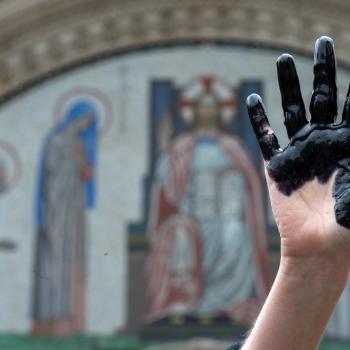
“Let each of you look not only to his own interests, but also to the interests of others” (Philip. 2:4 RSV). What Paul said here applies universally, and is a good standard, not just for Christians, but for everyone. We should be concerned about the common good. We should desire to work together, doing what we can to make things better for everyone. We must understand that our interest must not be in the promotion and service of money, but in humanity. Economics should be used for the sake of people, not people for the sake of money. In this way, we serve God, for by promoting the interests of others instead of greed, we engage the kind of justice and charity which God wants from us. On the other hand, if we think we can serve God while embracing avarice, we will find that money, not God, is our true master; as Jesus said, “”No one can serve two masters; for either he will hate the one and love the other, or he will be devoted to the one and despise the other. You cannot serve God and mammon” (Matt. 6:24 RSV). The way those who serve money get upset when they are told they should embrace social justice (let alone charity), by indicating it is something which it is not (communism or socialism) demonstrates what Jesus said is true: though many will act as if they are pious in public, they care less for the common good, and will show disdain whenever they are required to act on its behalf because their master, mammon, is being attacked. Since serving the common good serves God, they show contempt to God by denying God such service and respect.
People need to carefully read what the Republicans plan to do if they gain more power in the up-coming elections. They have no interest or concern in the common good. Indeed, their objections to and work against social justice shows that they want to undermine or destroy it. This can be seen in the way they want to do away with Social Security, Medicare, and Medicaid; even if they do not gain full power in Congress, they have plans to use whatever power they gain to hold the country hostage until Congress agrees with their demands to begin the deconstruction of the social safety nets:
For a few weeks now, they’ve been open about their intention to hold the debt ceiling hostage, a tactic they’ve used repeatedly since Tea Party Republicans tried it out in 2011. It works more or less the same way each time: Republican lawmakers say they will not vote to raise or suspend the debt ceiling, threatening to let the United States default on its debts, which would almost certainly trigger a global economic crisis. In exchange, they demand political concessions from the Democratic President.
This time, they’re planning to demand cuts to Medicare and Social Security — a policy position so staggeringly unpopular, one would expect them to keep it shelved until after they’d procured enough votes to enact it.[1]
Of course, the more power they get, the more they will do; if they gain enough power, instead of holding the economy hostage to have their demands enacted, they will straight out transform the nation and undermine its institutions. This can be seen in the way they want to immediately repeal the cost limits placed on medicine such as insulin, or defund the social safety net, putting its burden upon the states. It should be clear their interest lies not with the common good, or protecting and supporting the institutions which work for and promote justice, but rather, greed, as they seek a way to loot the nation for all it is worth as well as wield absolute power over everyone.
Looting the nation would be bad enough if that was the only thing they wanted to do. It isn’t. They want to entirely change the government. If they can do so, they plan on calling a Constitutional Convention as a way to place their ideology as the ruling ideology over the country. If they can’t do that, they plan to take control of state legislators and using them to undermine the general election, so that their politicians can and will be the only ones put in office. They justify themselves by continuing to promote and emphasize a wicked kind of propaganda, that is, by saying that the United States is not a Democracy. This is a lie which has become stated more and more often by Republicans, a lie which they plan to use to justify ignoring elections and the will of the people indicated by them. For, once it is believed that the United States is not a Democracy, then their authoritarian polices become that much more acceptable, and with it, any and all subversion of the general election becomes an acceptable means for placing themselves in positions of power and authority. The lie, of course, is a simple one; they try to say that a Republic cannot be a Democracy, and a Democracy cannot be a Republic, acting, that is, as if they were contraries. In reality, the United States, from the beginning, has always been understood to be a Democratic Republic, and so a country which is both (and not one or the other). They have subverted the meaning of both terms as a way to justify their rejection of the democratic principles. As Eugene Volokh stated, this spin runs contrary to the nation, its history, and its own self-understanding:
The United States is not a direct democracy, in the sense of a country in which laws (and other government decisions) are made predominantly by majority vote. Some lawmaking is done this way, on the state and local levels, but it’s only a tiny fraction of all lawmaking. But we are a representative democracy, which is a form of democracy.[2]
This is because, as he said:
Likewise, James Wilson, one of the main drafters of the Constitution and one of the first Supreme Court Justices, defended the Constitution in 1787 by speaking of the three forms of government being the “monarchical, aristocratical, and democratical,” and said that in a democracy the sovereign power is “inherent in the people, and is either exercised by themselves or by their representatives.” And Chief Justice John Marshall — who helped lead the fight in the 1788 Virginia Convention for ratifying the U.S. Constitution — likewise defended the Constitution in that convention by describing it as implementing “democracy” (as opposed to “despotism”), and without the need to even add the qualifier “representative.” [3]
The system, therefore, was set up to be a Democracy, working on behalf and supported by the will of the people, and was meant to serve the common good (even if it did so imperfectly). What is important is for us to recognize why many on the so-called right are trying to pit the notion of a Democracy against that of a Republic, for by doing so, they instill in their followers contempt against the common good, and with it, justify authoritarian control.
It is clear that if Republicans get any power, they will use it to continue to undermine American Democracy, to undermine its institutions, to transform it to be the plaything of their interest and will:
One of the crucial steps in destroying a democracy and reshaping a society is to capture the referees and circumscribe their power. After the attempts to overturn the election failed, rather than learning the lesson that they shouldn’t try to undermine the rule of law, the thieves surmised that they just needed better patsies to rubber-stamp their authoritarian impulses. To rush this along, the GOP has purged almost every elected leader who won’t go along with it. Two-thirds of Republican members of the House voted to overturn the 2020 election, and those who didn’t have been retiring or primaried at a terrifying rate.[4]
We are at a dangerous crossroads in United States history, and it is important for the public not to be swayed by propaganda to vote against their own general interest. They need to be told exactly what the Republicans plan to do to the country, and how, instead of helping the common person, and thus the common good, their policies would continue to harm both. Indeed, the public should be told how Republican policies already are to blame for many of the problems the country faces today. After all, inflation, supply chain concerns, and the like, even before COVID, was predicated for the country as a result of the implementation of Trump’s agenda. Similarly, the contempt they have for the ordinary worker should be enough to tell them that whatever they plan to do, it will not be for the sake of the worker, which is why they can be consistently be shown to do what they can to take away hard earned rights workers attained in the 20th century. What happened under Trump is only a prelude of things to come, if they get their way:
In 2017 the Trump administration hurt workers’ pay in many ways, including acts to dismantle two key regulations that protect the pay of low- to middle-income workers: it failed to defend a 2016 rule strengthening overtime protections for these workers, and it took steps to gut regulations that protect servers from having their tips taken by their employers. These failures to protect workers’ pay could cost workers an estimated $7 billion per year.[5]
It is time for the American people to see that the nation itself is suffering greatly thanks to Trump and his policies, and the solution lies not with the Republicans, but the Democrats who are doing what they can to fix all the damage Trump did (while facing opposition from the Republicans every step of the way). Public institutions set up for the common good need to be defended and strengthened. Only by remembering the common good, and defending the institutions which have been set up to protect the common good, can the country not only be preserved, but made better. The public needs to do what it can to stop the affront against the American people. The media needs to stop disguising the real issues, and using minor concerns as a way to undermine the systematic destruction which lies before us if the Republicans are able to do all that they desire to do. The system, while far from perfect and so needing reform to continue to promote and push for more justice and greater service for the common good, has to be safeguarded from the potential harm the Republicans would do to it.
Underlying the principle of the common good is respect for the human person as such, endowed with basic and inalienable rights ordered to his or her integral development. It has also to do with the overall welfare of society and the development of a variety of intermediate groups, applying the principle of subsidiarity. Outstanding among those groups is the family, as the basic cell of society. Finally, the common good calls for social peace, the stability and security provided by a certain order which cannot be achieved without particular concern for distributive justice; whenever this is violated, violence always ensues. Society as a whole, and the state in particular, are obliged to defend and promote the common good. [6]
That order is being subverted and attacked. Once again, it must be said that we have reached a crisis point in American history. Until all of those who would subvert and destroy the common good are stopped, and made sure they can never gain power, we cannot ignore the threat which lies before us. We must not let evil charm us, even if it puts on a show of piety, because it is clear, so long as those seeking power from the right ridicule the common, so long as they deny social justice, we risk losing everything if they get what they desire. Pope Francis described such people when he talked about those who ignored the wounded man on the road to Jerusalem in the parable of the Good Samaritan:
Jesus tells the story of a man assaulted by thieves and lying injured on the wayside. Several persons passed him by, but failed to stop. These were people holding important social positions, yet lacking in real concern for the common good. They would not waste a couple of minutes caring for the injured man, or even in calling for help. Only one person stopped, approached the man and cared for him personally, even spending his own money to provide for his needs. He also gave him something that in our frenetic world we cling to tightly: he gave him his time. Certainly, he had his own plans for that day, his own needs, commitments and desires. Yet he was able to put all that aside when confronted with someone in need. Without even knowing the injured man, he saw him as deserving of his time and attention. [7]
As Pope Francis also recognized, that parable should tell us about the need to preserve the common good, to preserve and protect it in the political order:
Jesus’ parable summons us to rediscover our vocation as citizens of our respective nations and of the entire world, builders of a new social bond. This summons is ever new, yet it is grounded in a fundamental law of our being: we are called to direct society to the pursuit of the common good and, with this purpose in mind, to persevere in consolidating its political and social order, its fabric of relations, its human goals. [8]
If we vote for those who reject the common good, mocking those who promote it, we connect ourselves with those who saw the wounded man on the road and ignored him. For the wounded man is not just anyone, but society as a whole, and we must do what we can to heal society by promoting justice, justice which recognizes and supports the common good. It is not too late. There is hope. Let us all do what we can.
[1] Kate Riga, “Top Republicans Keep Talking About Plans To Cut Medicare And Social Security” in Talking Point Memo (10-18-2022).
[2] Eugene Volokh, “Is The United States Of America A Republic Or A Democracy?” in The Washington Post (5-13-2015).
[3] Eugene Volokh, “Is The United States Of America A Republic Or A Democracy.”
[4] Brynn Tannehill, “Our Institutions Will Not Save Us From Republican Authoritarianism” in New Republic (10-18-2022).
[5] Josh Bivens, Daniel Costa, Celine McNicholas, Heidi Shierholz, and Marni von Wilpert, “Ten Actions That Hurt Workers During Trump’s First Year” in Economic Policy Institute (1-12-2018).
[6] Pope Francis, Laudato si’. Vatican translation. ¶157.
[7] Pope Francis, Fratelli tutti. Vatican translation. ¶63.
[8] Pope Francis, Fratelli tutti. Vatican translation. ¶66.
Stay in touch! Like A Little Bit of Nothing on Facebook.
If you liked what you read, please consider sharing it with your friends and family!













